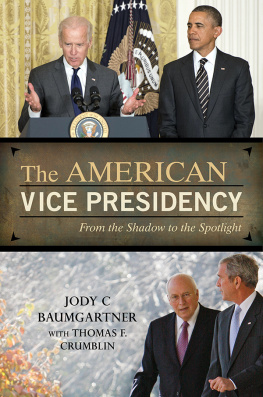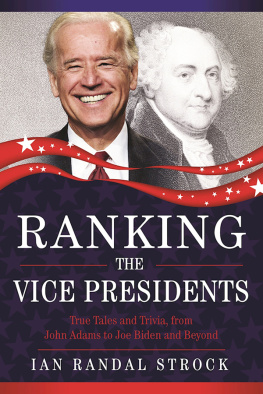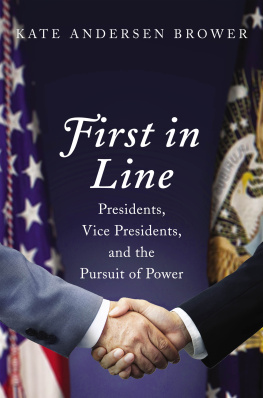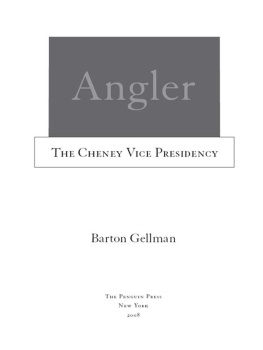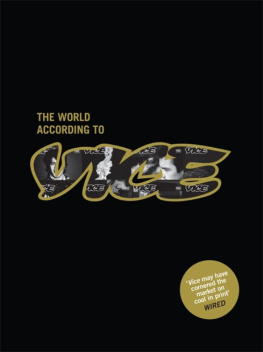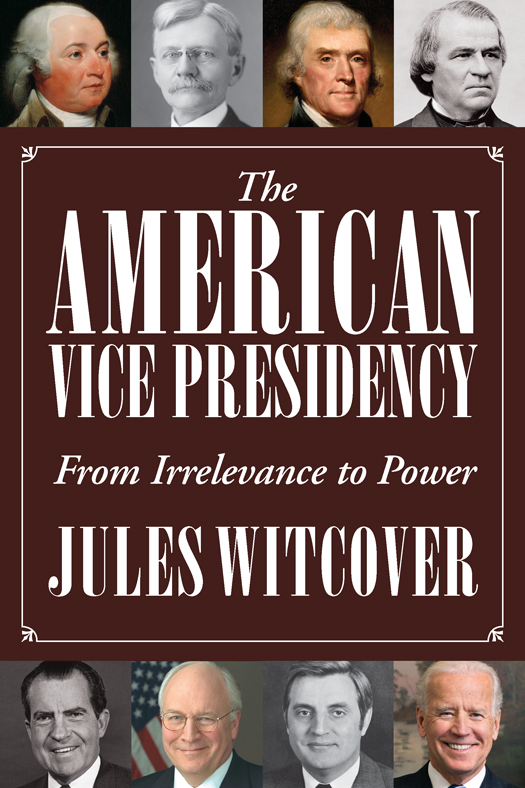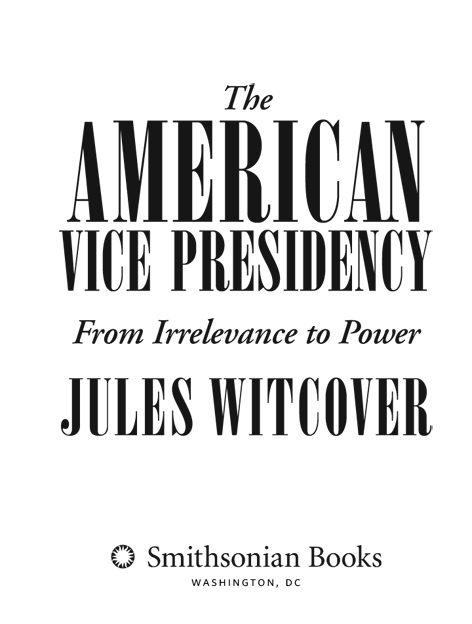Text 2014 by Jules Witcover
All rights reserved. No part of this publication may be reproduced or transmitted in any form or by any means, electronic or mechanical, including photocopying, recording, or information storage or retrieval system, without permission in writing from the publishers.
Published by Smithsonian Books
Director: Carolyn Gleason
Production Editor: Christina Wiginton
Edited by Robin Whitaker
Designed by Mary Parsons
Library of Congress Cataloging-in-Publication Data
Witcover, Jules.
The American Vice Presidency : From Irrelevance to Power / Jules Witcover.
pages cm
Includes bibliographical references.
ISBN 978-1-58834-471-7
eBook ISBN: 978-1-58834-472-4
1. Vice-PresidentsUnited StatesBiography. 2. Vice-PresidentsUnited StatesHistory. 3. United StatesPolitics and government. I. Title.
E176.49.W58 2014
352.2390922dc23
2014004242
For permission to reproduce illustrations appearing in this book, please correspond directly with the owners of the works as seen below. Smithsonian Books does not retain reproduction rights for these images individually, or maintain a file of addresses for sources.
Unless indicated below all photos are from the Smithsonian Institution.
Courtesy of the Library of Congress:
v3.1
CONTENTS
To Walter Mondale, who first made a reality of the assistant presidency
INTRODUCTION
T hrough most of the history of the American vice presidency, the office had little significance or utility in governing the nations affairs. Most often it was awarded purely on the basis of political considerations of home state or region or as a reward for past service. The office was chronically subject to lame jokes and its occupant to ridicule, often with reason. When the first vice president, John Adams, took office in 1789, he acknowledged regarding his role as a presidential standby: In this I am nothing, but I may be everything.
That dismal appraisal no longer holds. Over the past four decades, vice presidents as never before have helped shape and implement domestic and foreign policies in the administrations in which theyve served. In particular, four of the last six occupants of the officeWalter Mondale, Al Gore, Dick Cheney, and Joe Bidenhave performed tasks far beyond the old ceremonial and political chores of the vice presidency. They have become genuine partners in governance with their presidents. In the process, not only have they enhanced their own prominence and utility; they have also elevated the public stature of the office, to the point that it is not too much to say that the American vice president has for all practical purposes come to be the de facto assistant president. The days when public figures of stature routinely shunned the position are over.
But this transformation of the vice presidency did not occur overnight. For nearly two hundred years, its occupants generally toiled in obscurity and irrelevance until circumstances and enlightened presidential leadership gave the office its current prominence. No statute empowers the vice president; only the sitting president can do so by delegating authority and responsibilities, and even now there is no assurance it will be done.
When the founding fathers of the American Republic gathered in Philadelphia in 1787 to write the new nations constitution, the vice presidency was a mere afterthought in the discussion of how to choose the president. In the first election, there was never any doubt that General George Washington, hero of the Revolution and presiding officer of the Constitutional Convention, would be selected overwhelmingly. But the founders feared that following Washingtons service an indecisive scramble to succeed him would occur. So many states might put forward favorite sons that no one candidate would acquire the majority required to elect a widely acceptable president.
To avoid that outcome, Delegate Hugh Williamson of North Carolina proposed that each state appoint electors who would cast three ballots for the positionprominent citizens voting rather than legislators, to minimize improper influence. Only one of the three ballots could be given to a states favorite son, presumably producing a broader-based choice. Another delegate, Gouverneur Morris of New York, suggested that two votes per elector would serve the same purpose, and it was so decided.
This double-balloting for the presidency, it was reasoned, would arrive at the two most deserving candidates, so why not make the runner-up vice president? Then both offices would be filled by individuals presumably worthy of holding the higher office. At the same time, beyond being a standby for the presidency, the otherwise idle vice president would serve as president of the Senate, chairing it but voting only to break a tie. The scheme ensured, however, that from the vice presidencys first years and most of them thereafter, the office would be regarded as a mere appendage to the machinery of national governance, and its occupant would be airily dismissed as such. If there was any approximate model, it was the lightly regarded office of lieutenant governor in several of the original states.
The very notion of a vice presidency triggered a contentious debate among the founders over the necessity, utility, and wisdom of including the office, the manner in which its holder would be chosen, and what that persons functions and duties would be. The idea that a vice president was needed at all gained credibility and support only when the complicated method for selecting the president conveniently and simultaneously also provided for a spare president-in-waiting.
The same would be true if the election of the president were decided by a direct vote based on population, as favored by Morris, by James Wilson of Pennsylvania, and by James Madison of Virginia.
When Roger Sherman of Connecticut argued that the president ought to be appointed by and accountable to the legislature only, So some formula also had to be found to protect the rights and influence of the smaller states in choosing the chief executive, a formula in which the president would not be indebted to particular legislators who had voted for him. It was from this quest that creation of the vice presidency emerged.
To sidestep the direct voting for president by members of the national legislature, Wilson proposed that each state legislature choose as the presidential electors private citizens equal to the number of its congressional delegationtwo senators plus the number of legislators in the House of Representatives as determined by population. From this so-called electoral college, which would meet in the individual states to minimize collusion among them, the candidate achieving a majority would be elected president, and the runner-up, vice president.
When Madison reported this solution to the convention, he offered only a mild caution. The only objection which occurred, he wrote, was that each Citizen after having given his vote for his fellow Citizen [from his own state] would throw away his second on some obscure Citizen of another state, in order to ensure the object of his first choice. Then he
Indeed, the so-called double balloting was greeted with some optimism. Delawares John Dickinson decided that each states partiality for its own favorite son would work to the advantage of all. Let the people of each State choose its best Citizen, he said. The people will know the most eminent characters of their own State, and the people of a different State will feel an emulation in selecting those of which they have the greatest reason to be proud for the two top executive posts.



